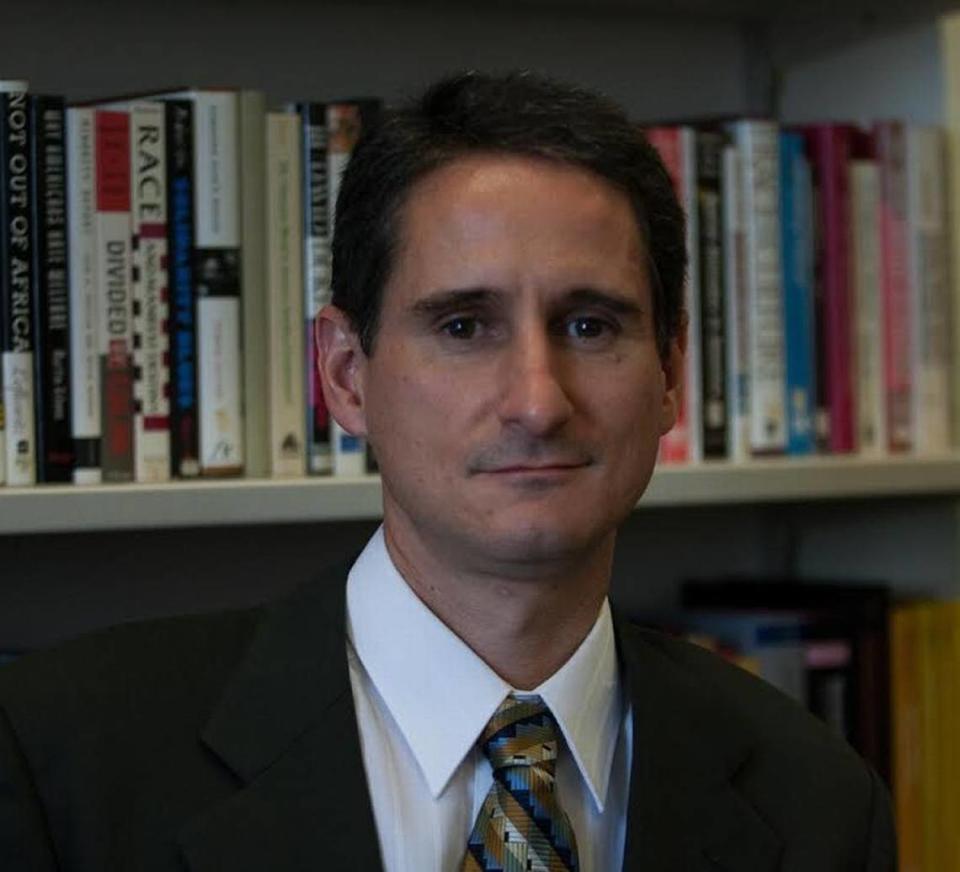From sidelines of Claudine Gay/Harvard scandal, I know higher ed must stick to standards | Opinion
- Oops!Something went wrong.Please try again later.
Five weeks ago, the Herald-Leader published a piece I wrote sympathetic toward Harvard President Claudine Gay. At the time, I thought that column would mark the end of my role in the scandals enveloping Gay – just a firsthand, affectionate window for local readers into the character of someone capturing headlines, plus an explanation why such a star found herself in Congressional crosshairs.
Little did I know, Claudine soon would deliver my proverbial 15 minutes of fame. It turned out her dissertation lifted portions of a paper I coauthored, yet didn’t cite our work, which critics viewed as the smoking gun needed to document Gay’s “academic dishonesty.”
I won’t tell the full story of how that unfortunate, and from my perspective, trivial bit of plagiarism sucked me into a media maelstrom. (I defended Claudine as best I could, to no avail.) Since Gay’s resignation, however, the hubbub hasn’t died down. Instead, debate widened to a broader question: Should universities change how they handle academic misconduct?
Some critics demand tougher standards, suggesting that Gay’s career developed as it did due to academia’s lax approach to plagiarism. A former philosophy prof now with the Ayn Rand Institute misleadingly questioned my ethics as Gay’s former “professor” because I shrugged off her infraction.
Others are wondering whether schools shouldn’t loosen standards, or at least limit their enforcement, lest they be weaponized by higher education’s enemies – such as the critics of Diversity, Equity, and Inclusion (DEI) now crowing about dethroning Gay and promising more to come.
Interestingly, journalists appear torn by this debate, judging from conversations they’ve held with me in private, seeing value in both contradictory impulses. Journalists receive strict training against plagiarism, so regardless of how negatively they view DEI opponents, they cannot countenance the theft of words.
More than one, off the record, confided sentiments like those an interviewer expressed to me in The New Yorker:
“…plagiarism is one of the worst possible sins I could commit. It would be an absolute nightmare if I accidentally copied someone’s work or if I were accused of doing so.”
So now that Gay’s presidency is in the rearview mirror, and I no longer need to worry about prejudicing her defense, please let me state clearly: While I stood by my former coworker, because what she borrowed from me was inconsequential, I strongly believe that universities should enforce rules intended to ensure scholarly integrity.
Plagiarism is never acceptable, even if penalties ought to depend on a variety of considerations (including the scope and severity of copying).
I do understand the temptation to ignore enemies of higher education who want to exploit university rules like those against plagiarism.
Law professor Charles Fried didn’t make the point artfully, when suggesting that politics shaped how he judged the “credence” of accusations, but considering the source of an accusation isn’t as ridiculous as those who pilloried him made it out to be. American institutions regularly adjust their handling of misbehavior depending on the process leading to its exposure.
In criminal courts, evidence might be excluded from consideration because law enforcement used improper routes to obtain it. Eating that fruit of the poisonous tree would only encourage abuse of police powers.
Similarly, otherwise legitimate law-enforcement practices – such as citing drivers for expired auto tags or broken tail lights – might be unacceptable if applied discriminatorily.
Concerns about selective enforcement were especially relevant with Gay, a Black woman who made history when she took Harvard’s helm. The activists who plumbed Claudine’s record may not have been fueled by sexism or racism – they’re hunting bigger game – but some of the fanbase pulled in their wake was.
Still, it would be a mistake for higher ed’s champions to water down standards, thinking that doing so would help fend off bad-faith outsiders. As documented at length in The Atlantic, Gay’s defenders already have done significant damage to academia, not just by trying to obscure the meaning of plagiarism, but by claiming most scholars engage in it.
Those corrosive false confessions appear to have convinced both anti-DEI crusader Christopher Rufo and billionaire Bill Ackman, who are jockeying to fund anti-plagiarism initiatives, expecting to expose rot at the core of academic research
Instead of rebuffing their efforts, scholars could embrace them as more opportunity than threat. Trust in universities already sits around an all-time low. These critics offer scholars the chance, on someone else’s dime, to show we meet higher research standards than commonly perceived.
Assuming conservatives will publicize good findings as well as bad, I could imagine scholars voluntarily submitting work, past and present, to be vetted for plagiarism, hoping to document a clean bill of health.
Indeed, if Rufo or Ackman wants to inaugurate his service using my dissertation – I did, after all, annoy them by defending Gay – I’d be thrilled to learn the results.

Stephen Voss is a political scientist specializing in elections and voting behavior at the University of Kentucky.

